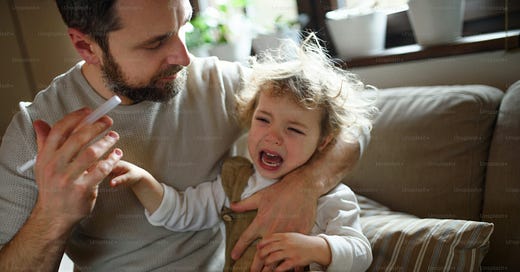Grace Over Guilt: Fatherhood in the Hard Moments
How to keep showing up when you feel like you’re falling short
There are moments in fatherhood that no parenting book can truly prepare you for.
Not the first diaper change or the sleepless nights. Not even the chaotic mornings with mismatched shoes and yogurt-covered toddlers.
It’s the quiet moments after the storm—the ones where you’re standing in the hallway, heart pounding, wondering if you were too harsh… too loud… too frustrated.
When the guilt sets in. And you start to question if you’re really being the dad they deserve.
The Collision Between Love and Frustration
The hardest part isn’t the tantrum or the spilled cereal. It’s how quickly love and anger can sit side by side.
You love them with a depth that defies explanation.
But sometimes, that deep love runs headfirst into exhaustion, stress, or your own unresolved emotions.
You raise your voice.
You overreact.
You snap.
And then comes the guilt—a heavy, quiet shame that follows you into the next room, into the night, into your thoughts long after the house is asleep.
They’re Just Kids. And You’re Still Learning Too.
Your kids are doing exactly what they’re meant to do. They test boundaries. They express big feelings in small bodies. They’re impulsive, loud, messy, beautiful little beings still learning how the world works.
And you, Dad—you’re learning too.
You’re learning how to show up.
How to model emotional control while managing your own.
How to guide without overpowering.
How to love unconditionally—even when it’s hard.
There’s no diploma in parenting. No certification for staying calm during your fifth argument about putting on pants. You’re figuring it out in real-time. And that’s okay.
A Real Dad Moment: Chaos, Coffee, and Commitment
We took a trip recently—three kids, one SUV, and more snacks than a Costco aisle. Between car games, spontaneous potty breaks, and trying to keep the peace over which playlist was playing (Disney vs. 90s rap is a brutal divide), it was a mission just getting to our destination with sanity intact.
We landed at a resort—great spot, but every day was full-on. Breakfasts, swims, meltdowns, naps (for them, not me), and planning just enough activities to keep everyone engaged without losing my mind.
But here’s the thing: I still worked out. Not because I had the time, but because I made the time.
One morning, before anyone else was up, I crept out of bed, pulled on my shorts in the dark, and did a quick 20-minute workout in the corner of the hotel room. Push-ups, squats, and resistance bands. My playlist was just barely loud enough in my headphones to keep me focused. And by the time they were waking up, I was already more centered, energized, and ready for the day ahead.
That one session didn’t just help my body—it helped my mind. I was calmer at breakfast. More patient when one of them threw syrup on their sister. More present while we played tag at the pool later that afternoon.
It reminded me: showing up for yourself in small ways helps you show up for them in big ones.
When You Feel Like You’re Failing
There are days I feel like I get it right—when I listen with patience, redirect with humor, and connect deeply.
And then there are days I go to bed with a pit in my stomach.
When I get it wrong, here’s what I try to remember:
The pause is powerful. Even 10 seconds to breathe can save a moment from boiling over.
Repair matters more than perfection. A sincere “I’m sorry” goes a long way.
Growth is the goal. Not perfection. Not performance. Just small, steady growth.
Kids are resilient. But so are dads.
They’ll Remember How You Handled the Hard Moments
Our kids won’t remember every raised voice or flustered response. What they will remember is the consistency. The effort. The way we owned our mistakes, said “I’m sorry,” and kept showing up.
They’ll remember the way we hugged them after a rough morning.
The way we kept pancakes on the table Saturday morning—regardless of how Friday night felt.
The way we never stopped trying.
You Deserve Grace, Too
This post isn’t about shame. It’s about grace.
Because guilt doesn’t make you a better father—but reflection does.
Because you’re already showing up. You’re already trying. And that effort matters.
Forgive yourself. Learn from the hard moments.
And remember: your kids don’t need a perfect dad. They need a present one.
Final Thoughts: Grace Over Guilt
You won’t get it right every time. You will lose your patience. You will raise your voice. You will feel like you failed.
But if you can learn to give yourself grace in those moments—to apologize, to repair, to try again tomorrow—then you're doing exactly what a good father does.
You're modeling resilience.
You're showing what accountability looks like.
You're teaching that love can coexist with imperfection—and still be powerful.
So here’s to the dads who are trying. The ones who care deeply, feel deeply, and sometimes fall apart quietly behind closed doors.
This one’s for you.




